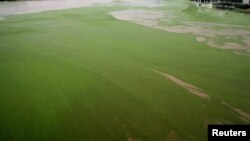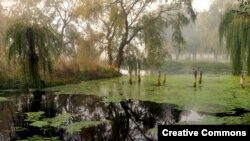A fast-growing aquatic plant found in wetlands around the world could be a sustainable, low-cost source of biomass for producing energy. Duckweed often covers the surface of lakes or slow-moving creeks, providing food for waterfowl and shelter for young fish and other aquatic creatures.
Scientists from the Chinese Academy of Sciences and Princeton University studied the floating plants as raw material for biofuel production. They say it has many benefits over other sources of biomass. Duckweed thrives in wastewater, so no valuable cropland is needed to cultivate it, it is not a part of the human food supply, and can be harvested more easily than algae.
In a report in the journal Industrial & Engineering Chemistry Research, the scientists say refineries using existing technologies can use duckweed to produce gasoline, diesel and kerosene at a cost competitive with oil when the fossil fuel reaches $100 a barrel.
Scientists from the Chinese Academy of Sciences and Princeton University studied the floating plants as raw material for biofuel production. They say it has many benefits over other sources of biomass. Duckweed thrives in wastewater, so no valuable cropland is needed to cultivate it, it is not a part of the human food supply, and can be harvested more easily than algae.
In a report in the journal Industrial & Engineering Chemistry Research, the scientists say refineries using existing technologies can use duckweed to produce gasoline, diesel and kerosene at a cost competitive with oil when the fossil fuel reaches $100 a barrel.












